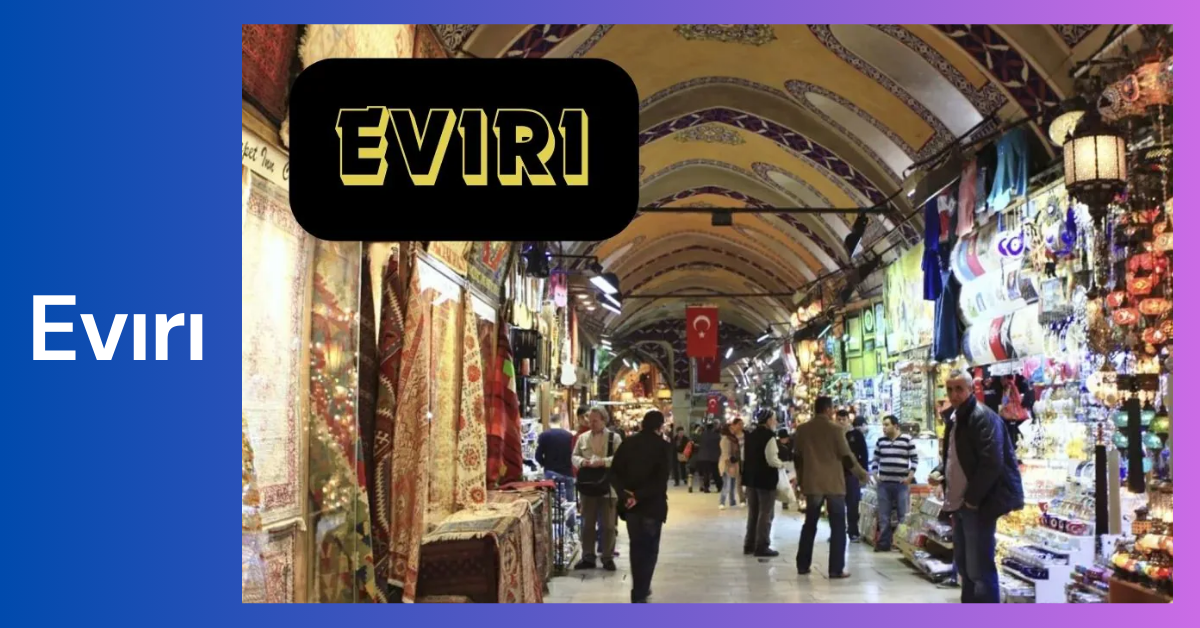
Turkey, a land where East meets West, is renowned for its vibrant culture, rich history, and unparalleled hospitality.
The concept of “Evırı” encapsulates the essence of Turkish culture.
Evırı represents the essence of Turkish culture, showcasing a rich blend of tradition, history, and warm hospitality. It highlights Turkey’s unique cultural identity, reflecting the nation’s communal spirit, generosity, and deep respect for heritage.
This article delves deep into the meaning, significance, and manifestations of “Evırı” in everyday life, providing a comprehensive guide for those interested in understanding this unique aspect of Turkish tradition.
Evırı is a concept deeply rooted in Turkish culture, representing the essence of the nation’s traditions, social customs, and lifestyle.
It is a term that embodies the warmth, hospitality, and communal spirit of the Turkish people.
Understanding Evırı provides a window into the soul of Turkey, offering insights into how these traditions shape daily life and interactions.
Historical Background of Evırı
Turkey’s history is a tapestry of various civilizations, including the Greeks, Romans, Byzantines, and Ottomans.
Each of these cultures has contributed to the rich cultural heritage that we now identify as Evırı.
From the grand architectural marvels to the intricate patterns in Turkish carpets, the historical evolution of Evırı reflects the diverse influences that have shaped Turkish society.
Ancient Civilizations and Their Influence
The ancient civilizations that once thrived in the region that is now Turkey have left an indelible mark on its culture.
The Hittites, one of the earliest civilizations, introduced the concepts of urbanization and social organization.
The Greeks and Romans brought their architectural and artistic prowess, which can still be seen in the ruins of Ephesus and the Hagia Sophia.
Byzantine and Ottoman Legacy
The Byzantine Empire contributed significantly to the religious and cultural landscape of Turkey, with Christianity playing a major role during this period.
The Ottoman Empire, which succeeded the Byzantines, infused the culture with Islamic traditions, resulting in a unique blend of religious and cultural practices.
The Ottomans were known for their elaborate ceremonies, sophisticated cuisine, and rich artistic traditions, all of which are integral to the concept of Evırı.
The Cultural Significance of Evırı
Evırı is more than just a term; it is a cultural phenomenon that permeates every aspect of Turkish life. It represents the collective identity of the Turkish people, reflecting their values, beliefs, and traditions.
The concept is ingrained in the way people interact, celebrate, and live together, fostering a sense of community and belonging.
Evırı and Social Etiquette
Social etiquette in Turkey is heavily influenced by Evırı. Respect for elders, politeness, and hospitality are paramount.
For instance, it is customary to greet everyone in a room upon entering and to show deference to older individuals.
These practices are manifestations of Evırı, emphasizing respect and communal harmony.
Community and Togetherness
Community life is central to Evırı. Turkish people value communal activities and often come together for social gatherings, religious ceremonies, and local festivals.
This sense of togetherness strengthens social bonds and fosters a supportive community environment.
Evırı in Turkish Hospitality
Welcoming Guests
Turkish hospitality is legendary, and Evırı plays a central role in this tradition. Guests are treated with the utmost respect and generosity. Offering tea or coffee is a common practice, symbolizing warmth and friendship.
The phrase “Misafir umduğunu değil, bulduğunu yer” (A guest eats what he finds, not what he hopes for) encapsulates the essence of Turkish hospitality, where guests are always made to feel welcome, regardless of circumstances.
Hospitality Rituals
Hospitality in Turkey extends beyond simple gestures; it involves elaborate rituals and customs.
From the moment a guest steps into a Turkish home, they are greeted with a warm smile, offered a seat, and served refreshments.
The host’s primary goal is to ensure the guest’s comfort and happiness, reflecting the deep-seated cultural value of Evırı.
Hosting Ceremonies and Events
Hosting ceremonies and events is a significant aspect of Turkish hospitality.
Whether it’s a wedding, a circumcision ceremony, or a holiday celebration, the emphasis is on creating a welcoming and festive atmosphere.
Guests are lavished with food, drink, and entertainment, all orchestrated to reflect the spirit of Evırı.
Evırı in Turkish Cuisine
Culinary Traditions
Turkish cuisine is a vital component of Evırı, characterized by its diversity and richness. Meals are often a communal affair, bringing families and friends together.
Dishes such as kebabs, mezes, and baklava are not just food items but are symbols of Turkish cultural identity.
Traditional Recipes
Recipes passed down through generations are a testament to the importance of tradition in Turkish cuisine.
Each region in Turkey has its own unique dishes and cooking methods, contributing to the overall mosaic of Turkish culinary art. Evırı is evident in the meticulous preparation and sharing of these traditional foods.
Dining Etiquette
Dining etiquette in Turkey reflects the cultural values of Evırı. Meals are usually shared, and it is common for diners to serve each other.
The emphasis is on enjoying the meal together and appreciating the company of others. Offering food to guests and ensuring everyone has enough to eat are important aspects of Turkish dining etiquette.
Symbolic Foods
Certain foods hold symbolic significance in Turkish culture. For example, bread is considered sacred, and it is customary to kiss a piece of bread that falls on the floor and place it on a high surface.
This practice reflects the deep respect for food and sustenance ingrained in Evırı.
Evırı in Festivals and Celebrations
National Holidays
Festivals and national holidays in Turkey are vibrant expressions of Evırı.
Events such as the Republic Day and Victory Day are celebrated with great enthusiasm, featuring parades, performances, and communal gatherings. These celebrations foster a sense of national pride and unity.
Religious Festivals
Religious festivals like Ramadan and Eid are integral to Turkish culture. During these times, families gather to break fasts, share meals, and participate in communal prayers.
The spirit of Evırı is evident in the generosity and hospitality extended to neighbors and friends during these celebrations.
Local Festivals
In addition to national and religious holidays, local festivals play a significant role in Turkish culture.
Each region has its own unique festivals, often centered around historical events, agricultural cycles, or local traditions.
These festivals are a celebration of local identity and community spirit, reflecting the diverse cultural landscape of Turkey.
Cultural Performances
Performances such as traditional dances, music, and theater are integral to Turkish festivals.
The whirling dervishes, folk dances, and classical Turkish music performances are not only entertainment but also a way to preserve and promote cultural heritage.
These performances are a vivid expression of Evırı, showcasing the richness and diversity of Turkish culture.
Evırı in Art and Craft
Traditional Arts
Turkish art and craft reflect the intricate patterns and vibrant colors that define Evırı.
From the geometric designs in Turkish carpets to the floral motifs in Iznik tiles, traditional art forms are a celebration of cultural heritage.
These art forms are meticulously crafted, often by hand, preserving ancient techniques and traditions.
Handicrafts and Carpets
Turkish carpets and rugs are world-renowned for their quality and beauty. Each carpet tells a story, with patterns and colors that are symbolic and carry cultural significance.
The art of carpet weaving is a tradition passed down through generations, reflecting the deep-rooted cultural values of Evırı.
Modern Interpretations
Contemporary Turkish artists continue to draw inspiration from traditional themes, creating works that resonate with the cultural essence of Evırı.
This fusion of old and new highlights the dynamic nature of Turkish culture, constantly evolving while staying true to its roots.
Architectural Heritage
Turkey’s architectural heritage is another significant aspect of Evırı. The stunning mosques, palaces, and historical buildings are testaments to the artistic and engineering prowess of ancient Turkish civilizations.
Structures like the Blue Mosque and Topkapi Palace are not just tourist attractions but also symbols of Turkey’s rich cultural legacy.
Evırı in Language and Communication
Turkish Proverbs and Sayings
The Turkish language is rich with proverbs and sayings that encapsulate the wisdom and values of Evırı.
Expressions such as “Bir fincan kahvenin kırk yıl hatırı vardır” (A cup of coffee commits one to forty years of friendship) highlight the importance of kindness and long-lasting relationships.
Non-verbal Communication
Non-verbal communication, including gestures and body language, is also a significant aspect of Evırı.
Simple acts like a nod, a smile, or a touch on the shoulder convey warmth and respect, reinforcing social bonds.
Understanding these subtle forms of communication is essential for appreciating the depth of Turkish social interactions.
Storytelling Traditions
Storytelling is a cherished tradition in Turkish culture, with stories often passed down orally through generations.
These tales, whether they are historical accounts, folk stories, or personal anecdotes, serve to preserve cultural knowledge and values.
The art of storytelling is a vital aspect of Evırı, fostering a sense of continuity and connection to the past.
Literary Heritage
Turkish literature, from classical poetry to modern novels, reflects the cultural richness of Evırı.
Works by poets like Rumi and writers like Orhan Pamuk offer deep insights into the Turkish soul, exploring themes of love, mysticism, and identity.
Literature serves as a bridge between the past and present, preserving the cultural essence of Evırı for future generations.
Evırı in Family and Social Structure
Family Values
Family is the cornerstone of Turkish society, and Evırı plays a crucial role in shaping family values and dynamics.
Respect for elders, strong family bonds, and collective decision-making are fundamental aspects of Turkish family life.
The concept of extended family is prevalent, with multiple generations often living together or maintaining close ties.
Social Hierarchy
Social hierarchy in Turkey is influenced by age, gender, and social status. Elders are given a place of honor and their opinions are highly valued.
This respect for hierarchy is a reflection of Evırı, emphasizing the importance of social order and harmony.
Role of Women
The role of women in Turkish society has evolved significantly, with women now actively participating in all spheres of life, from politics to business.
However, traditional values still hold a place in many aspects of life, with women often seen as the nurturers and caretakers of the family.
The balance between modernity and tradition is a key aspect of Evırı in the context of gender roles.
Community Support Systems
Community support systems are an integral part of Evırı, with neighbors and community members often stepping in to help each other in times of need.
This strong sense of community and mutual support is a reflection of the collective spirit that defines Turkish culture.
Evırı and Modern Turkey
Adapting Traditions to Modern Life
In modern Turkey, the concept of Evırı continues to thrive, adapting to the changing dynamics of contemporary life.
While urbanization and globalization have brought about significant changes, traditional values and practices remain an integral part of daily life.
The challenge lies in balancing modernization with the preservation of cultural heritage.
Cultural Preservation Efforts
Efforts to preserve and promote Turkish culture are evident in various initiatives, from cultural festivals to government programs aimed at safeguarding traditional arts and crafts.
These efforts are crucial for ensuring that the essence of Evırı is passed on to future generations.
Global Influence
Turkey’s strategic location and rich cultural heritage have made it a significant player on the global stage.
The influence of Turkish culture can be seen worldwide, from the popularity of Turkish cuisine to the global recognition of Turkish art and literature.
Evırı, as a cultural concept, continues to resonate beyond Turkey’s borders, fostering cross-cultural understanding and appreciation.
Future Prospects
Looking to the future, the concept of Evırı will continue to evolve, influenced by technological advancements and changing social dynamics.
However, the core values of hospitality, community, and cultural pride will remain steadfast, guiding Turkey’s cultural journey.
Conclusion
Evırı is the heartbeat of Turkish culture, encapsulating the traditions, values, and social customs that define the nation.
From hospitality and cuisine to art and social structure, Evırı is a testament to the richness and diversity of Turkish cultural heritage.
Understanding Evırı offers a profound appreciation of Turkey’s unique cultural identity, fostering a deeper connection to its people and traditions.
As Turkey continues to evolve, the essence of Evırı will remain a guiding force, preserving the warmth, hospitality, and communal spirit that make Turkish culture truly exceptional.
FAQs about Evırı
What does Evırı mean?
Evırı is a cultural concept in Turkey that embodies the nation’s traditions, social customs, and lifestyle. It represents the warmth, hospitality, and communal spirit of the Turkish people.
How is Evırı reflected in Turkish hospitality?
Evırı is reflected in Turkish hospitality through the generous and respectful treatment of guests. Offering tea or coffee, ensuring the comfort of guests, and hosting elaborate ceremonies are key aspects of Turkish hospitality.
What role does Evırı play in Turkish cuisine?
Evırı plays a significant role in Turkish cuisine, emphasizing the importance of communal meals, traditional recipes, and dining etiquette. Turkish cuisine is a celebration of cultural heritage, with each dish reflecting the values of Evırı.
How does Evırı influence social interactions in Turkey?
Evırı influences social interactions in Turkey by promoting respect for elders, politeness, and communal harmony. Social etiquette, non-verbal communication, and storytelling traditions are all manifestations of Evırı in daily life.
Is Evırı relevant in modern Turkey?
Yes, Evırı remains relevant in modern Turkey, adapting to contemporary life while preserving traditional values. Efforts to safeguard cultural heritage and promote Turkish culture on the global stage ensure the continued significance of Evırı.





